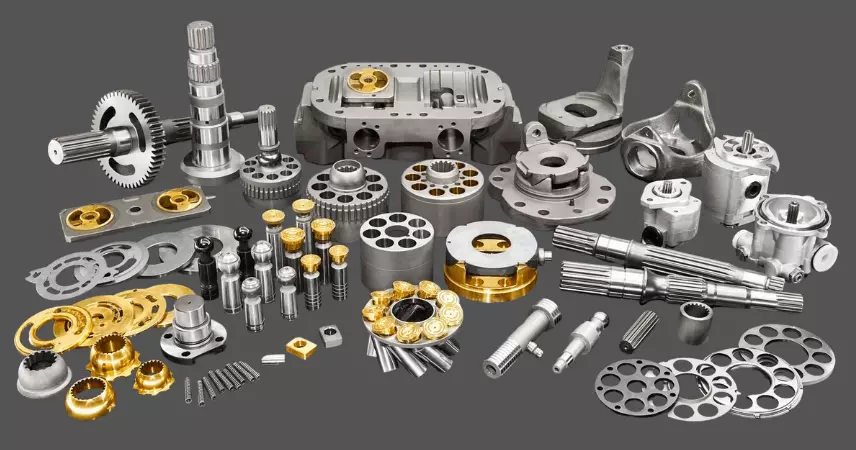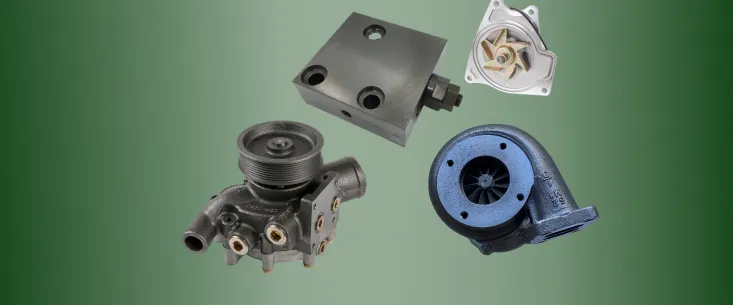+86-135 3388 0668
Introduction to Hydraulic Piston Pumps

In the world of industrial machinery, few components are as essential and powerful as the hydraulic piston pump. Often hailed as the heart of hydraulic systems, hydraulic piston pumps play a pivotal role in converting mechanical energy into fluid power, which is then used to perform various tasks, from lifting heavy loads to operating intricate machinery. These pumps stand at the intersection of technology and efficiency, providing the muscle behind many industries, from construction to agriculture, and even aerospace.
A hydraulic piston pump is designed to pump hydraulic fluid at high pressure, allowing it to transfer energy and power to other parts of a system. This type of pump is essential in applications requiring substantial force and power, such as in construction equipment, mining machinery, and even aircraft systems. The hydraulic piston pump's ability to operate under extreme conditions with high precision and efficiency makes it an indispensable tool in various sectors.
How Hydraulic Piston Pumps Work

At the core of a hydraulic piston pump is the piston, a small, cylindrical component that moves within a barrel. This design allows the pump to generate high pressure by displacing hydraulic fluid. The pump works by creating a vacuum to draw in the hydraulic fluid, which is then pressurized by the piston and expelled to the hydraulic system. This pressurization is the key to transmitting power efficiently throughout the system.
Hydraulic piston pumps typically feature either a fixed or variable displacement design. In a fixed displacement pump, the amount of fluid displaced with each rotation of the pump remains constant. In contrast, a variable displacement pump can adjust the fluid flow based on system demands, offering greater flexibility and efficiency in applications that require varying levels of power.
Types of Hydraulic Piston Pumps
There are several types of hydraulic piston pumps, each designed to meet different needs and application requirements. The most common types include:
Axial Piston Pumps: In this design, the pistons are arranged in a line and aligned with the axis of the pump. These pumps are commonly used in high-pressure systems and are known for their durability and efficiency. They are widely utilized in mobile equipment and heavy machinery.
Radial Piston Pumps: Unlike axial piston pumps, radial piston pumps arrange the pistons in a circular pattern around a central drive shaft. This type is ideal for applications requiring high flow rates and low-to-medium pressures. Radial piston pumps are often used in industrial applications such as machine tools and injection molding machines.
Bent-Axis Piston Pumps: These pumps feature a unique design where the axis of the pistons is angled to the axis of the drive shaft. Bent-axis pumps offer high efficiency and are suitable for applications requiring high torque and high-pressure performance.
Advantages of Hydraulic Piston Pumps
Hydraulic piston pumps stand out for several reasons. Their ability to generate high pressures makes them ideal for heavy-duty applications where other types of pumps might fail. Furthermore, their precision and efficiency ensure smooth and controlled operations, even in the most demanding environments.
One of the major benefits of hydraulic piston pumps is their versatility. They can be used in a broad range of applications, from powering industrial machinery to assisting in the operation of aircraft systems. Additionally, the pumps' ability to deliver consistent, reliable power makes them a preferred choice in systems where downtime is not an option.
Additionally, hydraulic piston pumps are often designed to work in conjunction with hydraulic motors, ensuring that power is transmitted efficiently throughout the system. Their capacity to handle both high and low-pressure conditions allows them to be adapted for various tasks, making them a cornerstone of modern hydraulic systems.
Applications, Maintenance, and Future Trends of Hydraulic Piston Pumps
Real-World Applications of Hydraulic Piston Pumps
Hydraulic piston pumps are integral to the operation of various machinery across numerous industries. Whether it's lifting heavy loads, operating construction equipment, or assisting in the aerospace sector, these pumps provide the necessary power to get the job done. Below are some of the key industries where hydraulic piston pumps shine:
Construction: Hydraulic piston pumps are at the core of many construction machines, from excavators to bulldozers. These pumps help power hydraulic cylinders that lift, dig, and push heavy loads with great force. The ability of piston pumps to provide constant, reliable power allows construction teams to operate efficiently and safely in challenging environments.
Mining: Mining operations often require powerful machinery capable of handling extreme conditions. Hydraulic piston pumps are used in mining vehicles, drills, and material handling equipment to ensure that power is consistently available when needed. The high-pressure capabilities of these pumps make them suitable for lifting and transporting heavy materials in the mining industry.
Aerospace: In aerospace applications, hydraulic systems play a critical role in powering control surfaces, landing gear, and other essential components of an aircraft. Hydraulic piston pumps are used to provide the high-pressure fluid necessary to operate these systems. The reliability and precision of these pumps are crucial in the high-stakes environment of aviation.
Agriculture: From tractors to harvesters, hydraulic piston pumps are used in a variety of agricultural machinery. They enable efficient operation of hydraulic systems that are used to control equipment such as plows, tillers, and balers. These pumps help increase productivity on the farm by enabling precise control over machinery and improving performance.
Maintenance of Hydraulic Piston Pumps
Despite their robustness and reliability, hydraulic piston pumps require regular maintenance to ensure they continue to operate efficiently. Over time, components such as seals and bearings may wear out, and the hydraulic fluid may become contaminated. Proper maintenance can help prevent premature pump failure and extend the service life of the equipment.
Key maintenance steps for hydraulic piston pumps include:
Regular Inspection: Regular inspections should be conducted to ensure that the pump is free from leaks and wear. Additionally, monitoring the performance of the pump helps identify issues before they become severe.
Fluid Monitoring: Hydraulic fluid plays a vital role in the operation of piston pumps, and maintaining clean fluid is crucial for the pump's longevity. Contaminated or degraded fluid can lead to reduced performance or pump failure.
Seal Replacement: Over time, the seals in a hydraulic piston pump can wear out, leading to leaks and reduced efficiency. Regular replacement of these seals ensures optimal performance and prevents fluid loss.
The Future of Hydraulic Piston Pumps
As industries continue to evolve, so do the technologies that power them. In the future, hydraulic piston pumps are expected to become even more efficient, with innovations focused on improving energy efficiency and reducing environmental impact. The integration of smart technologies, such as sensors and predictive maintenance software, is likely to become more common in hydraulic systems, helping to monitor pump performance and optimize usage.
Additionally, with the rise of renewable energy and the push for more sustainable practices, hydraulic systems are being designed to be more energy-efficient, reducing energy consumption while maintaining their high-performance standards. The future of hydraulic piston pumps lies in the balance between power, efficiency, and sustainability, ensuring that these essential components continue to meet the needs of various industries for years to come.
In conclusion, hydraulic piston pumps are indispensable in the modern world, offering unmatched power, versatility, and efficiency. Their role in a wide range of industries, from construction to aerospace, highlights their importance and the vital part they play in driving progress. As technology advances, these pumps will continue to evolve, providing even greater capabilities and efficiencies to keep up with the demands of the future.
Search
Blog & News